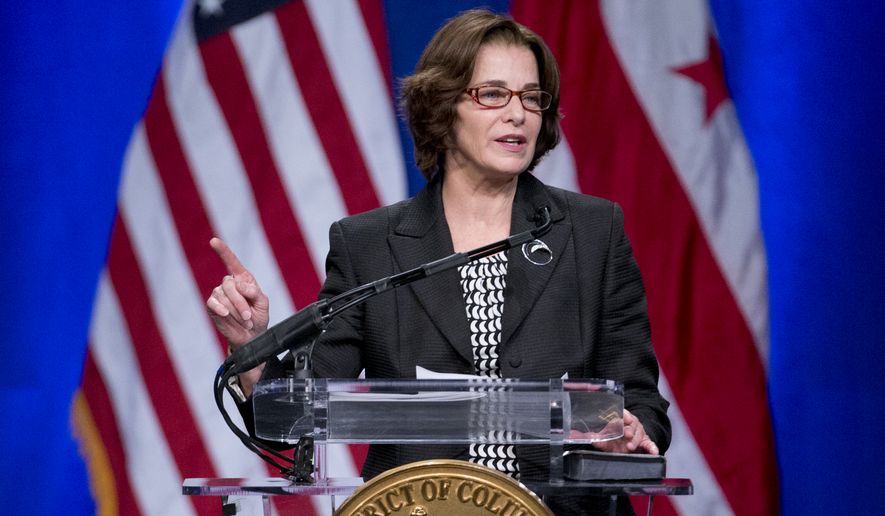Legislation authorizing doctors to prescribe a lethal dose of medication to terminally ill patients cleared its first major hurdle Wednesday in the D.C. Council as the District looks to join a small number of states that have legalized physician-assisted suicide in the past quarter-century.
Introduced by Council member Mary Cheh, Ward 3 Democrat, the “Death With Dignity Act” made it out of the five-member Committee on Health and Human Services by a 3-2 vote and is expected to go before the full council in the coming weeks.
“I introduced this bill to give dying patients greater choice and control over their final moments,” Ms. Cheh said in deliberations before the vote. “In the face of imminent death, meeting a patient’s individual needs and wishes compassionately should be our top priority. If a dying person wishes to peacefully end his or her life rather than endure prolonged pain and suffering, we should not stand in their way.”
Only five states — California, Oregon, Montana, Vermont and Washington — have legalized physician-assisted suicide since 1994, the year a ballot measure was narrowly passed in Oregon, while 22 states have introduced but ultimately failed to pass similar measures over that span.
But the right-to-die movement has made significant gains in the last decade.
Washington became the second state to legalize physician-assisted suicide through a 2008 ballot measure, and the Montana Supreme Court ruled in 2009 that the practice is legal there. Vermont and California enacted right-to-die measures legislatively in 2013 and 2015, respectively.
More than 20 states also are considering legalizing the practice.
Council member Yvette Alexander, chairwoman of the Committee on Health and Human Services, took the unusual step of allowing a committee vote on the “Death With Dignity Act” despite her opposition to the provision.
Given the life-or-death nature of the issue, Miss Alexander, Ward 7 Democrat, said she would rather see the act approved by a ballot measure.
“I do not believe that this is a decision that should be made by the 13 members of the Council,” she said at Wednesday’s deliberations. “Given the nature of this bill being a literal life-or-death issue, I believe that this matter is best left to the residents of the District of Columbia by way of a ballot initiative.”
Council member David Grosso, at-large independent, was expected to be the swing vote on the committee. Calling it “one of the more difficult pieces of legislation” that he has ever had to consider, he ultimately cast the deciding vote in favor of the bill.
“As a matter of basic principle, I believe that adults should be able to make choices about their own lives and bodies,” Mr. Grosso said. “It is hard for me to imagine telling a person in the final months of her life that she must continue to fight if she prefers to end things on her own terms.”
Council member Brianne Nadeau, Ward 1 Democrat, voted against the bill, while LaRuby May, Ward 8 Democrat, voted in support of it.
Opponents of physician-assisted suicide contend it puts vulnerable populations — including the disabled, elderly and poor — at risk of being coerced into ending their lives.
Mat McCollough, executive director of the D.C. Developmental Disabilities Council, said the bill incentivizes patients, insurance companies and governmental bodies to choose suicide given its relatively cheap cost compared to other health care options.
“To a person that’s given six months to live with a terminal illness, in many cases the doctors are wrong if they’re given proper health care,” said Mr. McCollough, 40, who suffers from cerebral palsy. “With this bill in existence, there’s a danger folks will not get proper health care because there’s an easy way out.”
But Charmaine Manansala, political director of Compassion & Choices, who has suffered from multiple sclerosis for 15 years, said disabled people want the same options as others in the event of a terminal diagnosis.
“Terminally ill people with disabilities should have the same autonomy to utilize medical aid in dying as an end-of-life option as everyone else,” Ms. Manansala said in a statement. “Regardless of whether someone is disabled or not, they must be mentally capable and terminally ill to qualify for medical aid in dying, and they have to self-administer the medication if they decide to take it.”
Proponents and opponents of the measure held lobbying days last month to try to sway the Council ahead of Wednesday’s vote.
J.J. Hanson, president of the Patients Rights Action Fund, is spearheading the No DC Suicide effort. Pointing to his own experience overcoming a terminal brain cancer diagnosis, Mr. Hanson said physician-assisted suicide laws “lead to irreparable damage for our society’s most vulnerable populations.”
“Not only does the availability of lethal drugs diminish hope for vulnerable patients, but the lower cost of lethal drugs compared to treatment gives governmental bodies and insurance companies the opportunity to deny treatment, leaving patients with a cheaper, deadlier option instead,” Mr. Hanson said at the Sept. 22 lobbying day.
The “Death With Dignity Act” will go before the full committee on Oct. 18.
• Bradford Richardson can be reached at brichardson@washingtontimes.com.




Please read our comment policy before commenting.